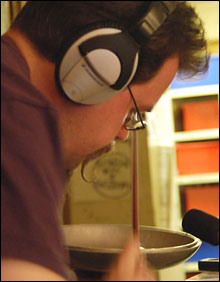
Patrick McGinley |
Patrick McGinley is an inveterate traveler. In the last year alone, the Boston-born sound artist, who records as Murmer, has been in Austria, Estonia, Spain, Latvia, Germany, the UK, and rural France, where he currently lives. The sounds from his varied travels crop up in his delicately textured music, which incorporates field recordings, found sounds, and everyday objects. On his latest release, for example, a gorgeously weather-worn disc called We Share a Shadow (Helen Scarsdale Agency), McGinley constructs a pair of quietly dramatic pieces from recordings of rain, windswept power lines, the rumble of a German bus, the ambient noise of crickets and air conditioning in a Portuguese village, as well as bowed metal rods, a plucked barbed wire fence, the scraping of a hollow tree, and a reverberating antenna in an empty, cavernous oil tank.Though he’d been a fan of abstract music since he was a teenager (an interest cultivated, he notes, listening to WZBC), McGinley’s interest in making music using everyday sounds was piqued when he first lived abroad, studying theater in France. “When I arrived in Paris in ’96,” he recalls by email from London, where he was in the midst of an extended stay, “I remember walking the streets and hearing so many amazing new sounds, and imagining how I could capture them and compose with them. There was one sound in particular that to this day I still go back and try to find when I’m in Paris — it was a sort of cavernous ventilation hum, huge and distant, coming through some grated basement windows of a huge government building (perhaps it’s the prefecture? not sure . . . ) on the Place de la Republique. I had no recording device back then, and I’ve never heard it since.”
In the years since that initial, elusive, hum-induced epiphany, McGinley has become an active member of a far-flung network of artists working with field recordings and found sounds. Beyond his own recordings, sound installations, and live performances as Murmer, for the past five years he has hosted and produced Framework, a weekly radio program on London’s Resonance FM devoted to field recordings and their use in composition.
When asked about his influences, McGinley focuses not on the canonical figures of sound art and abstract electronic music but rather on the role of collaborative projects in shaping his work and the importance of the advice he’s received from fellow artists. He also cites a more unusual influence: traditional Irish folk music. McGinley is an avid performer and in both the festive Irish jigs and the meditative abstract drones that he creates, he argues, there’s a palpable sense of losing yourself in the music. And, equally as important, there’s a strong grassroots, communal element to the music’s performance and dissemination.
“This is what has led me to believe that this ‘other’ music that we’re all making is nothing short of a new folk music, in the true sense of the term. Folk being a movement by and for a community, largely non-academic and self-taught, non-commercial and self-sustaining — that’s what we’re doing. The fact is simply that the definition of community is changing. Whereas before, and within the realm of traditional musics, it was defined by a geography and a culture, we are now seeing the development of non-geographical communities based on the connections we are able to develop through the Internet,” he says.